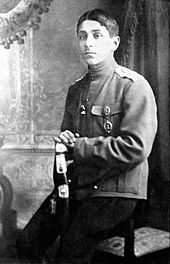Mikhail Zoshchenko
| Mikhail Zoshchenko | |
|---|---|
 | |
| Born |
August 10 [O.S. July 29] 1895 St.Petersburg, Russia |
| Died |
July 22, 1958 (aged 62) Leningrad, USSR |
Mikhail Mikhailovich Zoshchenko (Russian: Михаи́л Миха́йлович Зо́щенко, Ukrainian: Михайло Михайлович Зощенко; August 10 [O.S. July 29] 1894 – July 22, 1958) was a Soviet author and satirist.
Biography
Zoshchenko was born in 1894, in St.Petersburg, Russia, according to his 1953 autobiography. His Ukrainian father was an artist and a mosaicist responsible for the exterior decoration of the Suvorov Museum in Saint Petersburg.[1] His mother was Russian. The future writer attended the Faculty of Law at the Saint Petersburg University, but did not graduate due to financial problems. During World War I Zoshchenko served in the army as a field officer, was wounded in action several times, and was heavily decorated. In 1919, during the Russian Civil War, he served for several months in the Red Army before being discharged for health reasons.

- ^ This photograph is in the public domain
He was associated with the Serapion Brothers and attained particular popularity in the 1920s as a satirist, but, after his denunciation in the Zhdanov decree of 1946, Zoshchenko lived in dire poverty. He was awarded his pension only a few months before he died.
Zoshchenko developed a simplified deadpan style of writing which simultaneously made him accessible to "the people" and mocked official demands for accessibility: "I write very compactly. My sentences are short. Accessible to the poor. Maybe that's the reason why I have so many readers."[2] Volkov compares this style to the nakedness of the Russian holy fool or yurodivy.
Zoshchenko wrote a series of children’s short stories about Lenin.
Selected bibliography (in English translation)

- A Man Is Not A Flea, trans. Serge Shishkoff, Ann Arbor, 1989.
- Before Sunrise. Trans. Gary Kern, Ann Arbor, 1974.
- Nervous People and Other Satires, ed. Hugh McLean, trans. Maria Gordon and Hugh McLean, London, 1963.
- Scenes from the Bathhouse, trans. Sidney Monas, Ann Arbor, 1962.
- Youth Restored. Trans. Joel Stern, Ann Arbor, 1984.
- The Galosh. Trans. Jeremy Hicks, New York, 1996.
Notes
- ↑ Introduction to Nervous People and Other Satires page viii
- ↑ Solomon Volkov, Shostakovich and Stalin, p.40.
Further reading
- Scatton, Linda Hart (1993). Mikhail Zoshchenko: Evolution of a Writer. Cambridge University Press. ISBN 0-521-42093-8.
- Volkov, Solomon (2004). Shostakovich and Stalin: The Extraordinary Relationship Between the Great Composer and the Brutal Dictator. Knopf. ISBN 0-375-41082-1.
External links
- Creative Commons English translation of Zoshchenko's ultra-short story Nervous People
- Discovering Zoshchenko Alexander Melnikov, Russia Beyond the Headlines, 2 October 2009
- English translation of Zoshchenko's short story Honest Citizen
- Three short autobiographies by Zoshchenko
|